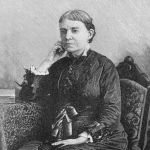I did not live until this time
Crowned my felicity,
When I could say without a crime,
I am not thine, but thee.
This carcass breathed, and walked, and slept,
So that the world believed
There was a soul the motions kept;
But they were all deceived.
For as a watch by art is wound
To motion, such was mine:
But never had Orinda found
A soul till she found thine;
Which now inspires, cures and supplies,
And guides my darkened breast:
For thou art all that I can prize,
No bridegroom’s nor crown-conqueror’s mirth
To mine compared can be:
They have but pieces of the earth,
I’ve all the world in thee.
Then let our flames still light and shine,
And no false fear control,
As innocent as our design,
Immortal as our soul.




















Comment form: